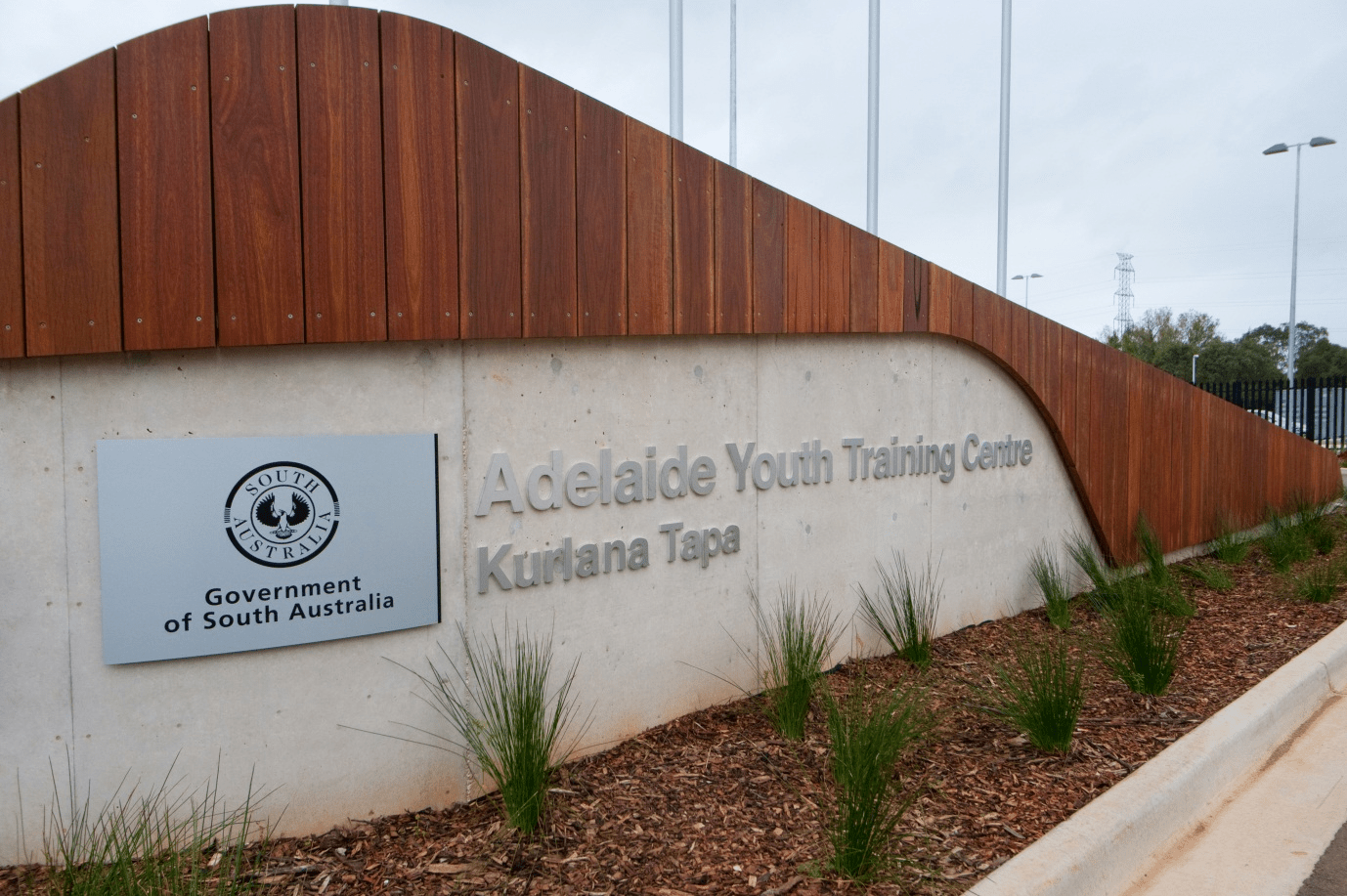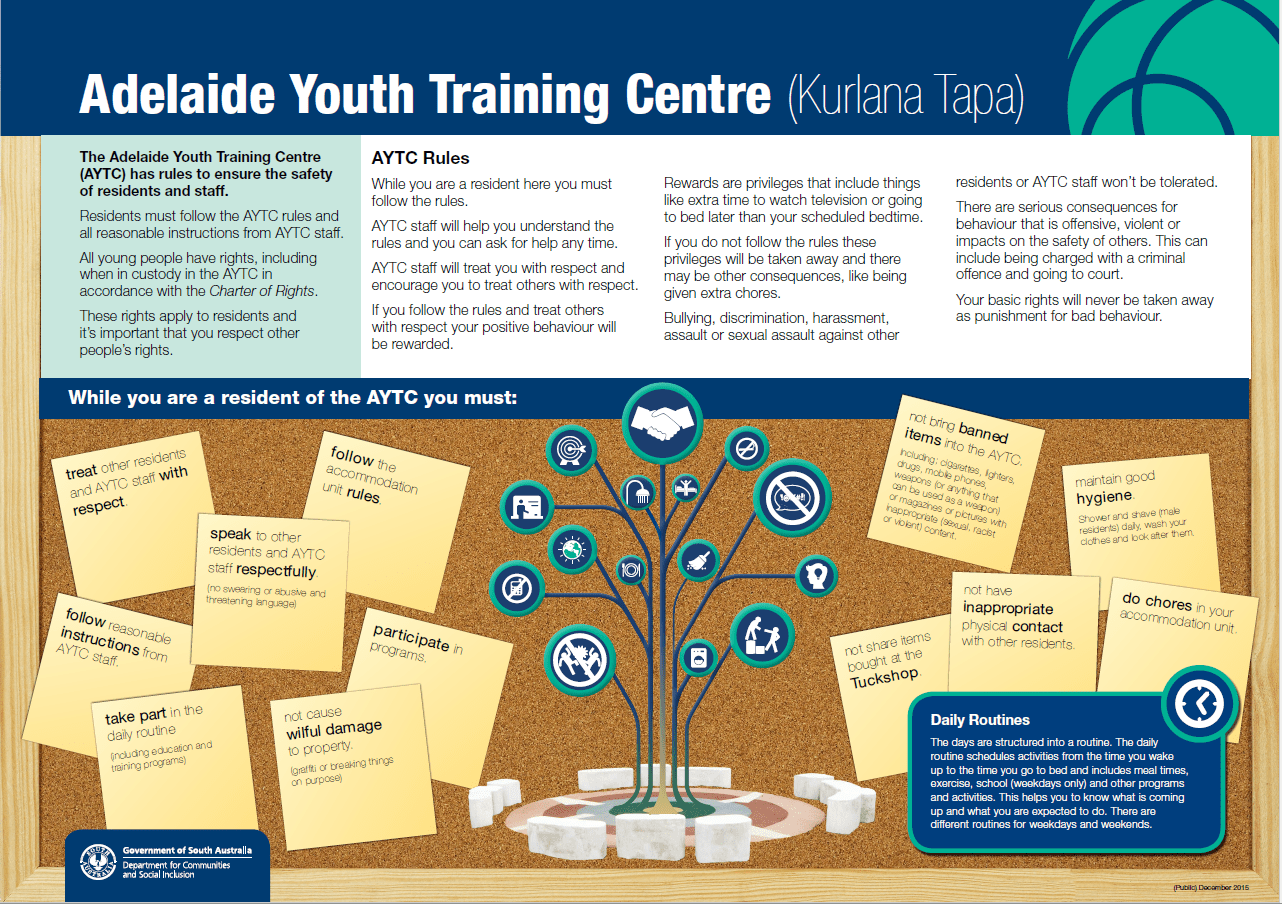
Kurlana Tapa Youth Justice Centre ensures a safe custodial environment that supports young people’s individual needs, varying developmental stages and cognitive functioning. The Centre’s diverse population includes young people from different cultures and demographics.
All residents, including those who are 18 years and over, receive ongoing assessment and review, including review of their behaviour and risk levels.
The Centre uses a Behaviour Support Framework to encourage and support young people to develop positive behaviours and take responsibility for the choices and the progress they make, set goals, develop life skills and address dysfunctional patterns of behaviour.
Individual case plans assist the young resident with transition planning and goal setting to support a successful return to the community.
Youth Justice has a range of programs and strategies that address the needs of young people in areas including criminal thinking, mental health, trauma, family inclusiveness, cultural identity and connection, social and independent skills, relationship skills and education.
Youth Justice works collaboratively with a range of partners, including not-for-profit organisations and other State Government agencies, to provide on-site services to residents.
Kurlana Tapa Youth Justice Centre supports and encourages family, peers, professionals and community members to maintain contact with residents.
Charter Of Rights For Children and Young People Detained in Youth Justice Facilities
South Australia has adopted the 'Charter of Rights for Children and Young People detained in Youth Justice Facilities' from the Australian Children's Commissioner's and Guardians Model Charter 2014.
This Charter of Rights tells you what you can expect while you are detained. The rights apply to everyone so you have to respect other people's rights.
You have the right:
- To be treated equally, and not treated unfairly because of your sex, sexuality, race, religion, disability or other status.
- To be treated with respect and dignity by staff and to be kept safe while you are in the youth justice centre.
- To be given a copy of and have explained to you the rules of the centre, and rights and responsibilities, in a language that you can understand.
- To see a doctor or nurse whenever you need to, have your health assessed soon after you arrive, and to receive proper healthcare.
- To receive help for your mental health if you need it, and to be transferred to a mental health facility for treatment if required.
- To get help if you have problems with drugs or alcohol.
- To have special care and protection if you are vulnerable or have special needs.
- To have regular contact with your family and friends through visits and phone calls.
- To get help to see a lawyer, and to talk to them privately.
- To have an interpreter for formal meetings or medical examinations if you are not fluent in English.
- To get information and news about what is happening in the world.
- To have a say in decisions about your rehabilitation and other issues that affect you.
- To participate in activities and programs that help your rehabilitation.
- To continue your education, or to do training to learn useful skills for work.
- To get exercise every day, and to go outside every day except in bad weather.
- To have enough good food (including food that is suitable for your culture or religion, or dietary requirements), and to have drinking water available whenever you need it.
- To have clean clothes, and to wear your own clothes if you go out of the centre.
- Not to be punished unfairly, and only in accordance with the rules of the centre or the law.
- Not to have force used against you, or restraints used on you, unless absolutely necessary, and never as a punishment.
- Not to be isolated from other young people unless necessary to keep you or others safe, and never as a punishment.
- To practice your religion or express your culture and, whenever possible, to participate in cultural celebrations and see religious or spiritual advisors.
- If you are Aboriginal or Torres Strait Islander, whenever possible, to participate in cultural activities and celebrations with other Aboriginal or Torres Strait Islander people.
- To make a complaint about your treatment to an independent person (like an official visitor) and to be told what happens with your complaint.
- Before you leave the centre, to get help with somewhere safe to live and ongoing support.
AYTC Rules
The AYTC has a set of rules for children and young people resident in the Centre. The young people are provided with a copy of these rules when they are admitted to the AYTC. A booklet is also provided to parents/ caregivers that explains young people's rights whilst in the AYTC, the rules of the Centre and other relevant information (for example, programs and visiting times).


